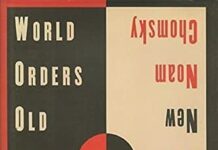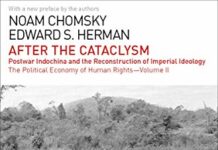
Ebook Info
- Published: 1993
- Number of pages: 95 pages
- Format: PDF
- File Size: 14.34 MB
- Authors: Noam Chomsky
Description
In a series of interviews with Noam Chomsky, the distinguished MIT scholar, lecturer, and linguist shares his thoughts on the development of modern biotechnology, economics, politics, and other significant topics. Original. 25,000 first printing.
User’s Reviews
Editorial Reviews: About the Author Noam Chomsky is Institute Professor of Linguistics at the Massachusetts Institute of Technology, and is the author of many books on U.S. foreign policy.
Reviews from Amazon users which were colected at the time this book was published on the website:
⭐Great book which describes our time today.
⭐If you’re trying to break into the world of Chomsky, this is a very tepid it roduction. I’d suggest buying Understanding Power – The Indispensable Chomsky.This is a good book to kill time with. Read it on the train ride to work. Nothing crazy, just interview excerpts. It’s about 85 pages of material.
⭐This is not a book I would recommend to most readers. There is not much new here (conceptually) that is not explored in later works in more detail (this book is a collection of interviews.) Here it is still the early 90’s, GATT was still alive, NAFTA is untried and there is no WWW. Chomsky is always brilliant and his insights into this world are even more interesting given how true they were shown to be.I enjoyed it. It gave me an opportunity to experience events I remember from 15 years ago with a very different worldview than I had then.
⭐This pamphlet comprises interviews with Chomsky from the early 1990s. They are not probing, and the subject matter is dated. It is not an illuminating read. No assumption or statement of Chomsky’s is debated or challenged; the typical formulation of the interviewer Barsamian’s contributions is “I’d like you to comment on…”, rather than “your judgement must contend with this piece of countervailing evidence”.Barsamian starts with economics. Chomsky cannot let up on the notion that when a company establishes a plant in another country it is “exporting jobs”. No international economist would agree; so far from “undercut[ting] opportunities for productive labor at home”, as Chomsky puts it, the US has created 50 million new jobs since 1970. Chomsky makes what is commonly known as the ‘lump of labour fallacy’, believing that there is a fixed amount of jobs that trade redistributes, whereas in reality an open economy is able to redistribute factors of production from lower-valued to higher-valued goods and services. Likewise Chomsky inveighs against GATT (now the World Trade Organisation) and the North American Free Trade Agreement, but misunderstands their rationale. It is wrong, and has been shown to be wrong, to say that “NAFTA will very likely be quite harmful for American workers too. We may lose hundreds of thousands of jobs.” Trade has little effect on aggregate employment; it merely shifts employment between sectors. The economic argument for trade – that the consequent ability to specialise will enhance productivity – is not addressed by Chomsky, who prefers to level charges of nefarious intent against free traders.Turning to politics, Chomsky returns to his theme of the alleged imperialist designs of the United States. He continually makes judgements that are supposed to be taken on trust but demand scrutiny. He declares, for example, that “the military budget is mainly for intervention. In fact, even strategic nuclear forces were basically for intervention.” Really? Where has the US “intervened” with strategic nuclear weapons since 1945? The rationale of US strategic nuclear forces is to deter a strategic nuclear attack on the American mainland. Chomsky appears to be merely declaring with rhetorical flourishes his disapproval of American military intervention. Ironically, his lambasting of all such intervention prevents him from analysing important developments in American policy over the last 20 years. He condemns the Reagan administration for intervening in Grenada (“it turned into a complete disaster”, which apparently is how Chomsky sees the restoration of democracy), yet fails to note how cautious Reagan was in projecting American power compared with his successors. Chomsky is not propounding a history of US foreign policy, but he ought in fairness to deal with its complexities rather than merely make bald generalisations.The discussion then takes a turn that has to be read to be believed: a chapter nominally about Yugoslavia makes accusations against Chomsky’s domestic critics that, to say the least, require rather extensive evidence if they are to be sustained. Chomsky attributes to “the right wing in the West” support for Serb aggression. His evidence for this thesis is hardly careful or extensive: it consists solely of a letter to The Economist from a well-known eccentric Serb apologist. Chomsky pays no attention to rather better-known sources, such as Margaret Thatcher or Jeane Kirkpatrick, who called at an early stage for support for Bosnia. Ironically, the case against other western conservatives over Bosnia – namely that a pessimism about the limits of politics prevented them from acting sooner against Serb imperialism – is not available to Chomsky, who in this booklet repeats exactly their ‘realist’ arguments: “You have to ask about the consequences, and they could be quite complex…. It’s not so simple.”The book gets worse. Chomsky casually describes the historian Angelo Codevilla as propounding an argument about the effects of colonialism that is “so low you’d have to go to the Nazi archives” to find something comparable. Comment on Chomsky’s rhetorical trope is unnecessary. Chomsky instead extends his approval for exposing official deceit to, of all people, the Nobel laureate Rigoberta Menchu. Those who have read David Stoll’s book on Miss Menchu will appreciate the irony here.Chomsky next turns to decrying the society he lives in. He depicts the United States as a haven for ubiquitous and influential religious fundamentalism. The trouble is, he once again cites no data and considers no countervailing evidence. The US does indeed strike the outside observer as unusual in its extensive civic professions of religious conviction, but the crucial question for a democratic polity is not its citizens’ beliefs in origins and eschatology but whether those beliefs are separated from political practice. The subtlety of this question is not considered in Chomsky’s ex cathedra assertion that “we could move back to real pre-Enlightenment times” – a particularly tendentious remark when read in 2002, not long after the US has managed to move one society, Afghanistan, firmly out of pre-Enlightenment times.The booklet concludes with a section entitled ‘Outside the Pale of Intellectual Responsibility’. The words are apparently a description of Chomsky by Martin Peretz, and Barsamian implicitly invites the reader to be shocked that so damning a judgement could be uttered of so upright a man as Chomsky. But then Chomsky discloses something remarkable. He complains that the New York Times doesn’t always print his letters, and reveals that on at least one occasion, and possibly more, “I contacted a friend inside, who was able to put enough pressure on so they ran the letter.” Read that statement again. On Chomsky’s own account, he used personal connections in order to gain access to newspaper columns reserved for the public, rather than allowing his arguments to be considered on their merits. So far as I am aware, this aspect of Chomsky’s political activism has received little comment, and it deserves to be better-known.
⭐Noam Chomsky is one of the most famous intellectuals in America today but for those of you unfamiliar with his ideas, be forewarned, he is very far on the left end of the political spectrum. With that said, I found this very short book, essentially a series of short question and answer discussions, to be a good introduction to his ideas and it left me anxious to learn more.
⭐Very good as expected from Noam Chomsky
Keywords
Free Download The Prosperous Few and the Restless Many (The Real Story) in PDF format
The Prosperous Few and the Restless Many (The Real Story) PDF Free Download
Download The Prosperous Few and the Restless Many (The Real Story) 1993 PDF Free
The Prosperous Few and the Restless Many (The Real Story) 1993 PDF Free Download
Download The Prosperous Few and the Restless Many (The Real Story) PDF
Free Download Ebook The Prosperous Few and the Restless Many (The Real Story)





